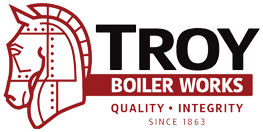Follow Us x
FAQ & Resources for Our Boiler Company in Albany & Glens Falls, NY
FAQ #1: Why is Boiler Operator & Maintenance Staff Training important?
A key aspect of boiler safety is the need formal training. The typical boiler room is home to hazards of all types, including the risk of a major boiler explosion due to low water excursions, improperly configured fuel systems, or control system failures. NFPA Boiler and Combustion Systems Hazards Code states that the owner "shall be responsible for establishing a formal training program" for operators and maintenance personnel. Both the responsibility and the need for these programs are very clear. Operating procedures, emergency conditions, recognizing and responding to hazards, and refresher training are all part of the requirements for adequate training programs. A review of boiler explosion studies will show that lack of training is often listed as a factor that could have been addressed.
FAQ #2: What is the importance of Boiler Control and Burner Management System Maintenance?
Control system maintenance is an often neglected part of boiler house operations. As with all maintenance functions, regularly scheduled inspections and functional verification of your boiler control and burner management systems can help prevent service interruptions and safety hazards. In addition to being good practice, this is also a requirement for compliance with NFPA boiler safety codes, which state that "a program shall be provided for inspection and maintenance of equipment at intervals consistent with the type of equipment used, service requirements, and manufacturer's recommendations". Many facilities will have regularly scheduled calibration programs for individual switches and sensors, but even these programs may fall short of the need to verify and document burner management system functionality.
FAQ #3 :I've Heard Steam Leaks can be Expensive. Can you give an Idea what they can cost me?
A leaking steam trap or other component can cost you plenty. Placing a dollar number on a failed steam trap can be a real surprise. For a typical boiler room generating 150 psig steam, a value of $7.50 per thousand pounds of steam would be a reasonable estimate. On a 150 psig header, a single steam trap stuck open with a trap orifice of 1/8th inch generates an estimated steam loss of 75.8 pounds per hour. At 8,760 hours per year of operation, fixing this trap would generate annual savings of $4,980!
Follow up question: When was the last time your facility followed through on a steam trap testing program?
FAQ #4: I Know we have Received Annual Tuning Reports from you. How can we use them to Monitor/Increase Efficiency?
Monitoring boiler performance on an annual basis is one of the most basic steps towards evaluating and maintaining good combustion efficiency. Many combustion tuning reports fall short of this goal by recording and evaluating only a few variables each year. Combustion efficiency is based on boiler exhaust or stack temperature and flue gas oxygen concentrations, and is a good indicator of how effectively the heat content of the fuel is being utilized by the boiler system. For a typical 150 psig boiler operating throughout the year at 45,000 pound per hour steam loads, a 2% improvement in combustion efficiency could generate fuel savings on the order of $100,000 per year. If you don't know what your baseline is, you could be sending money straight out the stack.
Follow up question: Do your annual boiler tuning reports include combustion efficiency?
FAQ #4a: Using Boiler Annual Tuning Reports to Monitor Efficiency, Part 2
The formation of boiler scale can result in a substantial increase in energy costs. Using guidelines established by the DOE, formation of scale as little as 1/32 of an inch can result in a fuel loss of 2%. The best defense against scale is a good offense; maintain quality boiler makeup water, proper boiler chemistry, and adequate boiler blowdown. Taking the time to perform annual boiler tune-ups and maintain quality tuning documentation also helps - an indirect indicator of scale is boiler flue gas temperature. Check your records for changes in flue gas temperature and combustion efficiency with boiler load and excess air held constant; these would be an indirect indicator of scale formation.
